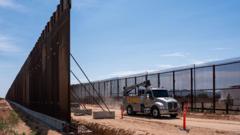Amid escalating violence from drug cartels in Ecuador, Gabriela, along with her daughter, fled to the US under the guise of a family vacation. With pending asylum claims, they face difficulty due to strict US immigration laws that question the legitimacy of asylum for victims of gang violence.
Fleeing Terror: An Ecuadorian Family's Asylum Journey in the US

Fleeing Terror: An Ecuadorian Family's Asylum Journey in the US
As cartel violence escalates in Ecuador, families like Gabriela's seek asylum in the US, facing challenging immigration laws and prolonged uncertainty.
Gabriela had long envisioned a family vacation to Disney World, a promise to her daughter that swiftly transformed into an escape from escalating cartel violence in Ecuador. Originating from Guayaquil, where she lived a stable middle-class life—working as a journalist, managing a mortgage, and sending her child to a private school—she soon found herself at the forefront of turmoil.
The background of her story is chilling; it began with ominous threats and culminated in the horrifying abduction and murder of her daughter's grandfather, a victim of gang extortion tactics related to the rampant drug trade. With rising homicide rates and increasing security threats, Gabriela's only option was to take her daughter to the US amidst fears for their lives.
Gabriela is now among millions with pending asylum applications in the US, a status that many fleeing from cartel violence find themselves in. However, legal hurdles complicate these cases, as current US asylum laws only recognize five specific grounds for asylum—none of which directly accommodate victims fleeing from organized crime or violent gangs.
Legal experts suggest that the current asylum process has become particularly challenging due to stricter definitions established during Donald Trump's administration, when asylum seekers needed to prove governmental negligence in protecting them from private violence. Despite some shifts in policies under the Biden administration, the fundamental legislation has remained unchanged, leaving many applicants, like Gabriela, in precarious situations as they seek asylum.
The legal landscape also casts doubts; with a record number of asylum claims being denied, Gabriela worries that her assertion of political persecution—stemming from corrupted law enforcement and government officials' affiliations with cartel groups—may not hold sufficient weight.
Rising fears among asylum seekers stem not only from legal uncertainties but from the reality of living under possible deportation risk while in the US. Gabriela describes a life of constant anxiety, working long hours in a factory, unsure if a momentary lapse could jeopardize her status. Her challenges echo those of fellow Ecuadorian asylum seekers, Maria and Luis, who also fled their towns plagued by gang violence, yet find themselves trapped in long, arduous await times for judicial hearings.
The US immigration system, currently confronting a backlog of approximately four million cases, remains an obstacle for many. Those like Maria wait years for hearings, deprived of security and peace, while facing potential rejection of their asylum applications based on their coerced ties to criminal organizations.
As the complexities of US immigration policies continue to evolve, voices like Gabriela's rally for a redefinition of what constitutes a viable asylum claim. She firmly believes that individuals escaping terror from violent gangs should be deemed victims deserving of protection—not as potential threats or contributors to systemic issues. Their struggle is emblematic of a larger, urgent need to address the rising violence across Latin America and the implications it has for asylum seekers in the US.



















